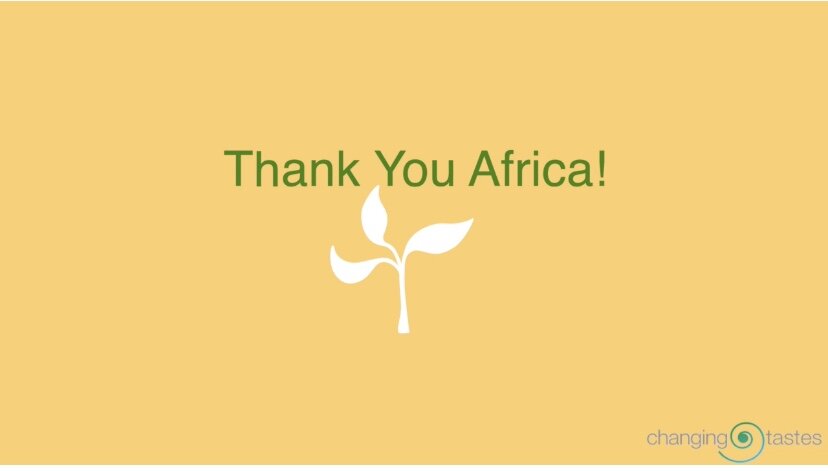thank you africa…
Thank You Africa works to raise awareness that it is because of Africa that we eat many of our favorite foods in America today. While some recognize that coffee came from Africa, too many Americans don’t know that many of the other foods we eat every day and consider American also came from Africa. They were brought here by enslaved people centuries ago on middle passage journeys.
By recognizing this African American ancestral legacy using food as our media, with a hearty scoop of appreciation, we intend to bring a new perspective to the table. One that brings respect and value to Africa, and also as a way of honoring this ancestral legacy. Slaves brought their seeds, agricultural expertise, and culinary ingenuity with them. We think it is a simple yet powerful concept. Gratitude leads to compassion, understanding, and value. Think of how it makes you feel when someone says “thank you” to you…Through the joy of eating delicious foods, we can build bridges instead of walls together! Let this simple act of kindness start a new conversation in the world.
Some of the most popular foods many of us eat or drink daily came from Africa:
Cola and coffee, two of the most popular beverages that many Americans drink daily, both originated in Africa. Kola nuts, from west Africa and coffee, from Ethiopia.
Rice and some varieties of oats and wheat, our most popular cereal crops which are also eaten daily by some as breakfast cereal, a sandwich, or part of dinner each night and are also gaining popularity as milks, among other “variations” are not only one of the oldest crops cultivated by mankind but also can be traced to Northwestern Africa, as well as the Iberian Peninsula and the Middle East.
Chiles that bring the heat to so many tables — and bottles of hot sauces — came from Africa, along with many other fruits, vegetables, herbs, and spices.
Tilapia, one of the world’s most commonly farmed fish, and renamed St. Peters fish for a time in the U.S., is native to Africa.
People think of Africa as a hungry continent. Both global warming and a rising population are serious threats to ongoing food production. We need to remember that it is because of African indigenous crops brought to the rest of the world that we eat what we do in America, Europe, and elsewhere today.
Changing Tastes’s Thank You Africa Program featured during United Nations World Food Day.
FREQUENTLY ASKED QUESTIONS…
1. Why only food?
At Changing Tastes, FOOD is our media, so we begin here with what we know the best.
Food tells a personal story, food is love and food is an easy way to communicate and share who we are in our most authentic ways with our friends and neighbors everywhere.
2. What about other places?
Yes, we agree! Food is our medium for appreciation of all countries. Thank you Mexico, Peru, China, Indonesia, and more.
The American dream is also a universal dream. We are all entitled to life, liberty, and the pursuit of happiness. We suggest that learning through delicious cuisine about our global neighbors creates an opportunity to bring us all together and build relationships through awareness, as we break down barriers built by unintended ignorance.
3. How can I help?
It’s easy and thank you so much for offering! As you will see, the cost of kindness is zero. We invite you to simply take a picture of you or a friend eating or drinking a cup of coffee, cola beverage, or a bowl of rice or oatmeal, granola bar or anything with rice in it (we are starting with the top 3) and post to our facebook page linked here and share!
Say “Thank you Africa” at home when you eat a food originally from Africa — like coffee, rice , cola (and kola nuts), okra, sweet potatoes, black eyed peas, watermelon, or chilis (including hot sauce!) — and post a photo on our Facebook page. Then share our intentional message of kindness & gratitude with your friends on social media and invite them to do the same.


